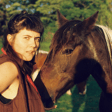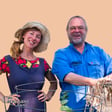
Village Dreaming with Mara Ripani
I just polished off my last jar of blackberry jam and it’s only April, which is why I need today’s guest to assist me in the finer arts of sustainable homesteading.
It’s Mara Ripani of Village Dreaming and Orto cooking school, a force of and for nature with a passion for greening cities, growing food, permaculture, preserving food, baking bread and sowing seeds.
Mara is about as earthed as its possible to be while still having a social media presence, propagating skills of from-scratch cooking, foraging, fermenting, soap making and seasonal attunement from her breathtaking solar passive farmhouse here in Central Victoria.
In this conversation, you’ll hear Mara’s alarm go off a couple of times telling her she needs to tend the bread, and you might too hear us chewing on dried plums, sipping on fragrant bay leaf tea that Mara poured for me on arrival.
This chat feels really apt as we move towards the colder months, one last hurrah of abundance and colour and harvest before we drop all our leaves, exposed and ensconced for winter.
Mara’s home on the web ~ Village Dreaming
Floral syrup recipes (including Mugolio ~ pine cone syrup)
Take a tour of Village Dreaming



















